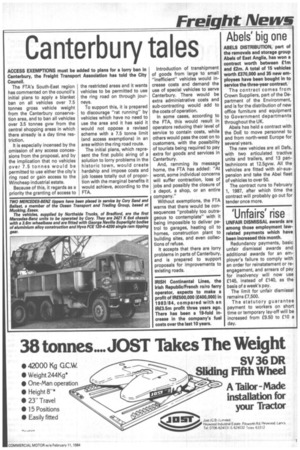Canterbury tales
Page 15

If you've noticed an error in this article please click here to report it so we can fix it.
ACCESS EXEMPTIONS must be added to plans for a lorry ban in Canterbury, the Freight Transport Association has told the City Council.
The FTA's South-East region has commented on the council's initial plans to apply a blanket ban on all vehicles over 7.5 tonnes gross vehicle weight from the Canterbury conservation area, and to ban all vehicles over 3.5 tonnes gvw from the central shopping areas in which there already is a day time restriction.
It is especially incensed by the omission of any access concessions from the proposal, and by the implication that no vehicles over 7.5 tonnes would be permitted to use either the city's ring road or gain access to the Wincheap industrial estate.
Because of this, it regards as a priority the granting of access to the restricted areas and it wants vehicles to be permitted to use the ring road on through journeys.
To support this, it is prepared to discourage "rat running" by vehicles which have no need to use the area and it has said it would not oppose a revised scheme with a 7.5 tonne limit (and access exemptions) in an area within the ring road route.
The initial plans, which represent the first public airing of a solution to lorry problems in the historic town, would create hardship and impose costs and job losses totally out of proportion with the marginal benefits it would achieve, according to the FTA. Introduction of transhipment of goods from large to small "inefficient" vehicles would increase costs and demand the use of special vehicles to serve Canterbury. There would be extra administrative costs and sub-contracting would add to the costs of operation.
In some cases, according to the FTA, this would result in operators reducing their level of service to contain costs, while others would pass the cost on to customers, with the possibility of tourists being required to pay extra for goods and services in Canterbury.
And, ramming its message home, the FTA has added: "At worst, some individual concerns will suffer contraction, loss of jobs and possibly the closure of a depot, a shop, or an entire company."
Without exemptions, the FTA warns that there would be consequences "probably too outrageous to contemplate" with it being impossible to deliver petrol to garages, heating oil to homes, construction plant to building sites, and even collections of refuse.
It accepts that there are lorry problems in parts of Canterbury, and is prepared to support proposals for improvements to existing roads.
















































































